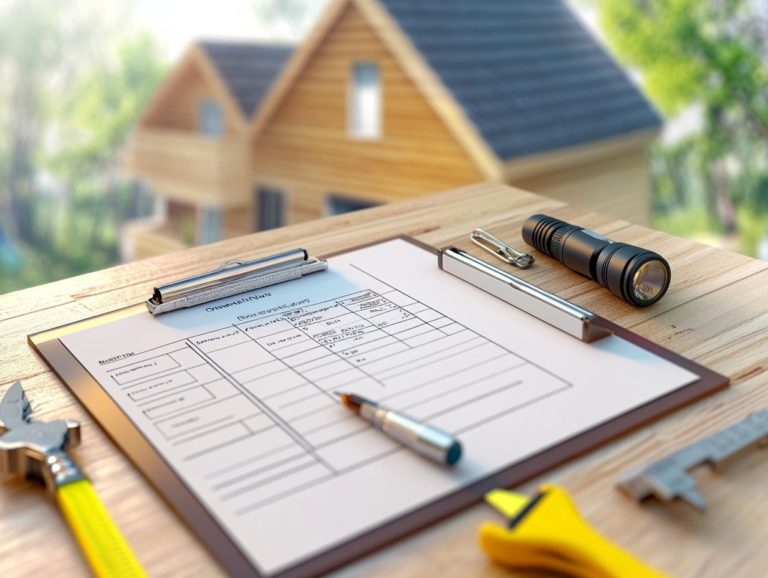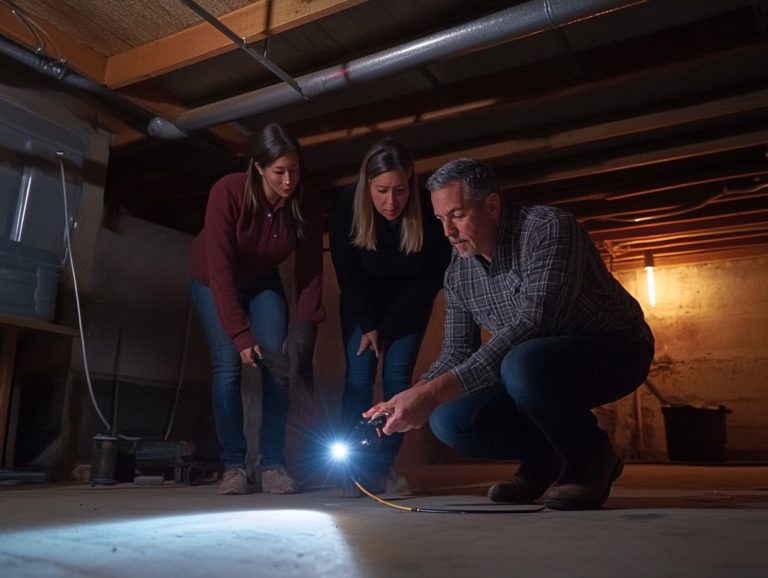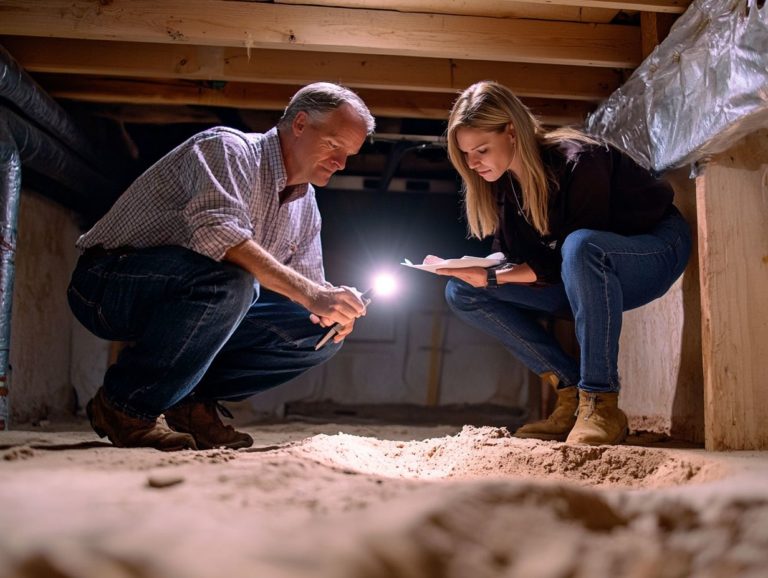How to Use Home Inspection Reports Effectively
When you re buying or selling a home, understanding the details of a home inspection report is key to your success!
This article breaks down everything you need to know from the typical components of a report to interpreting the findings and using them strategically in negotiations.
With tips for effective communication with your home inspector, you’ll be well-prepared to navigate these reports, ensuring you make informed decisions at every crucial juncture.
Contents
- Key Takeaways:
- Understanding Home Inspection Reports
- Interpreting and Analyzing a Home Inspection Report
- Using Home Inspection Reports for Negotiations
- Tips for Communicating with the Home Inspector
- Frequently Asked Questions
- What is a home inspection report and why is it important?
- How do I obtain a home inspection report?
- What should I look for in a home inspection report?
- Can I negotiate repairs or adjustments based on the home inspection report?
- How can I use a home inspection report to plan for future maintenance?
- Are there any tips for effectively using a home inspection report?
Key Takeaways:

When reviewing a home inspection report, pay attention to major issues like structural damage or safety concerns.
Be aware of the property’s overall condition and use the report to negotiate repairs, credits, or a lower purchase price.
Communicate clearly with the home inspector by asking for clarification on any confusing information and requesting additional details or recommendations.
Understanding Home Inspection Reports
Understanding home inspection reports is crucial whether you’re buying or selling a home. These detailed reports provide an assessment of a property’s condition and highlight any safety concerns or potential defects found during a visual inspection. For more information, consider navigating the home inspection process effectively.
If you’re evaluating a prospective home or preparing for an upcoming property inspection, knowing the basics of home inspection reports can greatly influence your negotiation strategy and enhance your communication with clients.
Certified home inspectors use checklists to conduct thorough evaluations, making these reports essential for informed decision-making.
What is Included in a Home Inspection Report?
A home inspection report gives you a detailed assessment of essential systems in the home, including heating, plumbing, and electrical setups, all summarized with the property s address.
The report highlights specific defects uncovered during the inspection, providing insights into potential safety hazards or necessary repairs. Often, the inspector includes photographs and descriptive notes to help you understand each element’s condition.
The assessment covers critical systems such as roofing, insulation, and appliances. It evaluates both their functionality and expected longevity, creating a thorough overview that highlights immediate concerns and provides a deeper understanding of the property’s health and maintenance needs.
Types of Home Inspection Reports
There are various types of home inspection reports, each tailored to meet different needs from standard visual inspections to comprehensive documents that include repair estimates.
Some reports focus solely on structural issues, while others examine specific areas like plumbing or electrical systems, offering a customized approach for homeowners or potential buyers.
Visual documentation, complete with photographs and diagrams, enhances these reports by providing clear evidence of the inspected conditions. This clarity allows you to fully understand the findings.
By adhering to established inspection standards, you ensure a thorough examination and maintain the integrity of the assessment process, enabling you to make informed decisions.
Interpreting and Analyzing a Home Inspection Report
Interpreting and analyzing a home inspection report is crucial for understanding the property’s overall condition. Knowing what to look for in a home inspection report helps you identify significant issues that could pose safety risks or affect market value.
Don’t wait to ask your inspector questions clarity can save you time and money!
For further assistance, consider scheduling a professional home inspection or consulting an expert.
Identifying Major Issues

Identifying major issues during a home inspection is essential. It helps to spot potential defects that can create serious safety concerns.
You may not realize the hidden dangers lurking within your walls, ceilings, or beneath your flooring. Structural defects can undermine your home’s integrity, raising legitimate worries about stability and safety for you and your family.
Electrical problems, such as outdated wiring or faulty circuits, aren’t just minor inconveniences. They can pose serious fire hazards and increase your energy costs, making it harder to use appliances effectively.
Then there s plumbing failures in this area can lead to water damage or mold growth. This creates unhealthy living conditions that no one wants to deal with.
Understanding these implications helps everyone involved. It can facilitate necessary negotiations, establish repair commitments, and ultimately provide the peace of mind that comes with a safe living environment.
Assessing the Overall Condition of the Property
Assessing the overall condition of a property is essential to the home inspection process. It offers valuable insights into its long-term viability and any required repairs.
A thorough evaluation entails examining various components, including the roof, plumbing, electrical systems, and foundation. For example, a well-maintained home will often feature a roof with no signs of wear or leaks.
The plumbing should demonstrate proper water pressure without any rust or wear and tear in the pipes. Conversely, signs of a property needing significant repairs may include uneven floors that hint at foundation issues or outdated electrical wiring posing safety risks.
By weighing these factors in the inspection report, you can gain a clearer understanding of the potential costs associated with maintaining the property. This allows you to make informed decisions.
Using Home Inspection Reports for Negotiations
Utilizing home inspection reports effectively grants you, as a buyer or seller, crucial negotiation leverage. Understanding these documents can significantly sway repair credits and shape your overall negotiation strategies within the real estate market. For more insights, check out understanding home inspection reports.
Requesting Repairs or Credits
Requesting repairs or credits after a home inspection is not just common practice. It s a vital strategy that allows you to address any issues uncovered during the inspection effectively.
Navigating this process can be tricky, so a strategic approach is key to ensuring your requests are taken seriously by the seller. Start by thoroughly reviewing the inspection report and highlighting the most significant issues that could impact the home’s value or safety.
It s wise to categorize these concerns based on urgency and impact. This will help you present them clearly during discussions.
When you reach out to the seller, frame your requests as a way to facilitate a smoother transaction rather than mere demands. This subtle shift in perspective can significantly enhance your chances of a positive response.
Using objective language supported by data from the inspection helps you build a compelling case that encourages cooperation and negotiation. This ultimately leads to a satisfactory resolution for everyone involved.
Negotiating the Purchase Price
Negotiating the purchase price based on a home inspection report is essential for you as a buyer. It allows you to tailor your offers according to repair costs and any other findings that come to light.
This strategy enables you to make informed decisions and presents an opportunity to tackle significant issues uncovered during the assessment. Consider the extent of repairs needed whether they re minor cosmetic fixes or major structural concerns as these factors can greatly impact your financial commitment.
By evaluating potential repair expenses, you can build a strong case for lowering your offer. This ensures it reflects the true value of the property and prevents you from overextending financially.
Don t miss this chance to negotiate wisely and save money! This strategic negotiation can lead to a more favorable purchase agreement that aligns perfectly with your budget and long-term aspirations.
Take charge of your home buying process today! A thorough inspection can save you time and money!
Tips for Communicating with the Home Inspector

Engaging in effective communication with your home inspector helps you understand the inspection report better.
This dialogue allows you to clarify confusing information and obtain important details or recommendations for your decision-making process.
Clarifying Confusing Information
Clarifying confusing information in a home inspection report is essential for accurately setting your expectations and understanding the property’s condition.
You may come across technical jargon or unclear statements that leave you uncertain about necessary repairs or potential issues.
If you find yourself in this situation, talk to your home inspector. They can explain complex findings and offer insights into the significance of various concerns.
Using visual aids, like photographs or diagrams, can help illustrate specific problems and their impact on the property s overall integrity. This collaborative approach fosters transparency and enables informed decisions.
Asking for Additional Details or Recommendations
Requesting additional details or recommendations from your home inspector can reveal valuable insights into home maintenance and the importance of any defects found during the inspection.
By encouraging open dialogue, you can better understand critical issues affecting future upkeep. Be sure to ask about maintenance practices that could extend the lifespan of key components, such as your roof, plumbing, or electrical systems.
Questions like “How often should I schedule roof inspections?” or “What common plumbing issues should I watch out for?” can provide practical tips.
Ask for trusted local contractors to ensure high-quality repairs, making the process easier for you.
Frequently Asked Questions
What is a home inspection report and why is it important?
A home inspection report shows the property’s condition and highlights any issues. It’s important because it helps you make informed decisions about buying or selling a home and identifies safety hazards or necessary repairs.
How do I obtain a home inspection report?

You can get a home inspection report by hiring a professional home inspector. They will thoroughly examine the property and provide a detailed report of their findings.
What should I look for in a home inspection report?
When reviewing a home inspection report, focus on major structural issues, potential safety hazards, and necessary repairs or maintenance. Also, take note of the age and condition of key systems like the roof, HVAC, and plumbing.
Can I negotiate repairs or adjustments based on the home inspection report?
Yes, you can negotiate repairs or adjustments based on the home inspection report. If major issues or safety hazards are identified, request that the seller address them before finalizing the purchase. You can also use the report to negotiate a lower price if significant repairs are needed.
How can I use a home inspection report to plan for future maintenance?
A home inspection report provides valuable information about the current condition of a property and potential future maintenance needs. Use the report to create a maintenance plan and budget for necessary repairs or upgrades.
Are there any tips for effectively using a home inspection report?
To use a home inspection report effectively, thoroughly review it and ask any questions you have. Discuss the report with your real estate agent and leverage it as a negotiating tool. Follow up on any necessary repairs or maintenance outlined in the report after purchasing the property.






